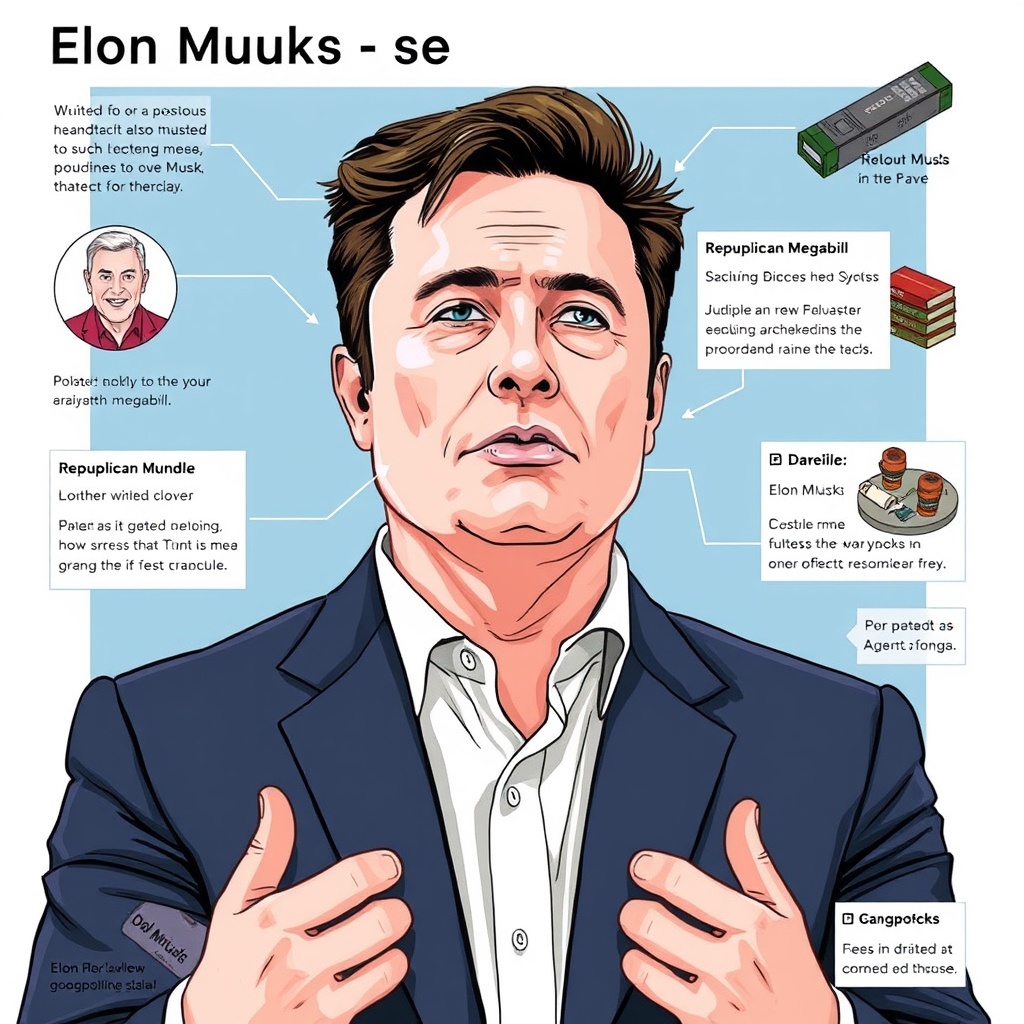Introduction
Elon Musk, the billionaire CEO of SpaceX and Tesla, has once again made headlines with his vocal criticisms of the Republican megabill. In a series of public statements and social media posts, Musk has renewed his attacks on the bill, which has been a topic of controversy in recent weeks. This article will delve into the details of Musk's criticisms, the context surrounding the megabill, and the potential implications of his statements.
Musk's initial tirade against the megabill occurred several weeks ago, and it seemed that the issue had died down. However, with his recent comments, it is clear that the billionaire entrepreneur is not backing down. His renewed attacks on the bill have sparked a flurry of attention from the media, politicians, and the public. As one of the most influential and successful business leaders of our time, Musk's opinions carry significant weight, and his criticisms of the megabill are likely to have a substantial impact on the ongoing debate.
The Republican Megabill: Context and Controversy
The Republican megabill is a comprehensive piece of legislation that aims to address a range of issues, including tax reform, healthcare, and infrastructure development. While the bill has been touted as a major achievement by Republican lawmakers, it has also faced significant criticism from Democrats and other groups. Musk's attacks on the bill are just one aspect of a broader controversy surrounding the legislation.
One of the main points of contention surrounding the megabill is its potential impact on the economy. Critics argue that the bill's tax cuts and spending provisions could lead to increased debt and deficits, while supporters claim that it will stimulate economic growth and create jobs. Musk's criticisms of the bill seem to be focused on its potential impact on innovation and entrepreneurship, which are key areas of interest for the billionaire entrepreneur.
According to a recent report by the nonpartisan Congressional Budget Office (CBO), the megabill could lead to a significant increase in the national debt over the next decade. The CBO estimates that the bill's tax cuts and spending provisions could add up to $1.5 trillion to the national debt by 2035. This has raised concerns among some lawmakers and economists, who argue that the bill's fiscal provisions are unsustainable and could have negative consequences for the economy in the long term.
Elon Musk's Criticisms: A Closer Look
Musk's criticisms of the megabill are multifaceted and far-reaching. In a series of tweets and public statements, he has argued that the bill's provisions could stifle innovation and hinder the growth of entrepreneurship in the United States. Musk has also expressed concerns about the bill's potential impact on the environment and public health, citing the need for more sustainable and equitable policies.
One of the specific areas where Musk has focused his criticisms is the bill's tax provisions. He has argued that the bill's tax cuts could benefit large corporations and wealthy individuals at the expense of smaller businesses and lower-income households. Musk has also expressed concerns about the bill's lack of investment in renewable energy and other sustainable technologies, which are key areas of interest for his companies, SpaceX and Tesla.
For example, Musk has pointed to the bill's provisions on electric vehicles, which he argues could hinder the growth of the industry and limit consumer choice. He has also criticized the bill's lack of support for renewable energy projects, such as solar and wind power, which are essential for reducing carbon emissions and mitigating climate change.
Implications and Reactions: A Divided Response
The reaction to Musk's criticisms of the megabill has been divided, with some lawmakers and business leaders praising his willingness to speak out, while others have criticized his views as misguided or self-serving. Republican lawmakers, in particular, have pushed back against Musk's criticisms, arguing that the bill is a necessary step towards promoting economic growth and job creation.
However, some Democrats and progressive groups have welcomed Musk's criticisms, seeing them as a validation of their own concerns about the bill. They argue that the bill's provisions could have negative consequences for the environment, public health, and the economy, and that Musk's criticisms highlight the need for more sustainable and equitable policies.
According to a recent poll by the Pew Research Center, a majority of Americans (56%) believe that the megabill's tax cuts will benefit large corporations and wealthy individuals, rather than smaller businesses and lower-income households. This suggests that there is significant public concern about the bill's provisions and its potential impact on the economy and society.
Conclusion
In conclusion, Elon Musk's renewed attacks on the Republican megabill have sparked a significant debate about the legislation and its potential impact on the economy, environment, and public health. While Musk's criticisms have been met with a divided response, they highlight the need for more sustainable and equitable policies that promote innovation, entrepreneurship, and social justice.
As the debate over the megabill continues, it is essential to consider the potential implications of the legislation and the need for more nuanced and informed discussions about its provisions. Musk's criticisms, while controversial, have contributed to a more nuanced understanding of the bill's potential impact and the need for more careful consideration of its consequences.
In the future, it will be essential to monitor the progress of the megabill and its potential impact on the economy, environment, and public health. As one of the most influential and successful business leaders of our time, Elon Musk's opinions will continue to carry significant weight, and his criticisms of the megabill will likely remain a topic of discussion and debate in the weeks and months to come. Ultimately, the outcome of this debate will depend on the ability of lawmakers and business leaders to work together to create more sustainable and equitable policies that promote innovation, entrepreneurship, and social justice.


Leave a comment